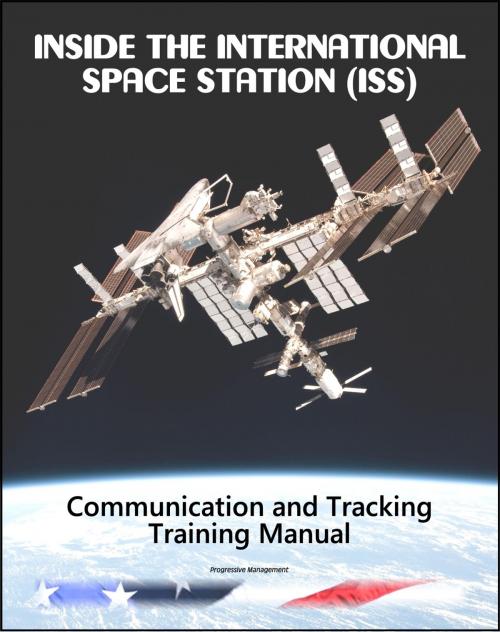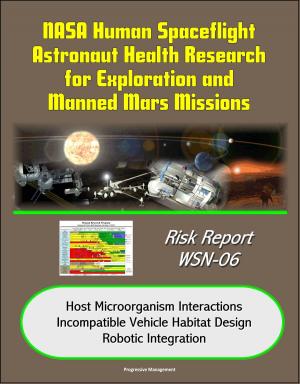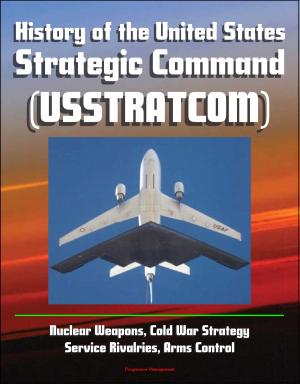Inside the International Space Station (ISS): NASA Communication and Tracking Astronaut Training Manual
Nonfiction, Science & Nature, Science, Physics, Astronomy| Author: | Progressive Management | ISBN: | 9781466122123 |
| Publisher: | Progressive Management | Publication: | December 15, 2011 |
| Imprint: | Smashwords Edition | Language: | English |
| Author: | Progressive Management |
| ISBN: | 9781466122123 |
| Publisher: | Progressive Management |
| Publication: | December 15, 2011 |
| Imprint: | Smashwords Edition |
| Language: | English |
Learn about the International Space Station (ISS) from the textbooks used by the astronauts! These astronaut and flight controller training manuals, produced by the Mission Operations Directorate (Space Flight Training Division branch) at NASA's Johnson Space Center, represent a major part of the formal flight crew training process. The manuals and workbooks are extremely detailed and comprehensive, and are designed for self-study. A full listing of all acronyms and abbreviations used in the text is included. They provide a superb way to learn about Station systems, hardware, and operational procedures. Special emphasis on crew interaction with the displays, controls, and hardware is included.
This up-to-date training manual covers the (ISS) communication and tracking system. Communication is an integral component of the International Space Station (ISS). Without extensive communication with the ground, scientific research, along with the safe, efficient, and reliable operation of ISS is not possible. The manual provides an overview of the United States On-Orbit Segment (USOS) Communication System and its subsystems. It also includes a brief overview of the Russian On-Orbit Segment (ROS) Communication System and its subsystems.
The purposes of the USOS Communication systems are to provide:
Two-way audio communication between onboard crewmembers in the Station, the U.S. Shuttle (docked and undocked), Extravehicular Activity (EVA) crewmembers, and the Flight Controller Teams
Video from internal and external ports on the Station to the onboard crew in the USOS and the U.S. Shuttle, as well as the Flight Controller Teams
Control of the Station's systems by Flight Controller Teams located within the Mission Control Center Houston (MCC-H), the Mission Control Center Moscow (MCC-M) the Payload Operations and Integration Center (POIC), and other International Partners' (IPs') control centers
Control of the Station's systems by the crew of the U.S. Shuttle and Flight Controller Teams using the Orbital Interface Unit and Early Portable Computer System (PCS) systems.
Control of the Station payloads and experiments by Flight Controller Teams located within the POIC and other International Partners' control centers
Personal Computer-to-Personal Computer communications of electronic files between the Flight Controller Teams and the onboard crew in the Station
Electronic file transfers to maintain the onboard flight software within the Command and Data Handling (CDH) System's Multiplexer/Demultiplexers (MDMs)
Audio and video communications between the onboard crew and their families as well as between the onboard crew and news reporters and other public affairs activities.
Learn about the International Space Station (ISS) from the textbooks used by the astronauts! These astronaut and flight controller training manuals, produced by the Mission Operations Directorate (Space Flight Training Division branch) at NASA's Johnson Space Center, represent a major part of the formal flight crew training process. The manuals and workbooks are extremely detailed and comprehensive, and are designed for self-study. A full listing of all acronyms and abbreviations used in the text is included. They provide a superb way to learn about Station systems, hardware, and operational procedures. Special emphasis on crew interaction with the displays, controls, and hardware is included.
This up-to-date training manual covers the (ISS) communication and tracking system. Communication is an integral component of the International Space Station (ISS). Without extensive communication with the ground, scientific research, along with the safe, efficient, and reliable operation of ISS is not possible. The manual provides an overview of the United States On-Orbit Segment (USOS) Communication System and its subsystems. It also includes a brief overview of the Russian On-Orbit Segment (ROS) Communication System and its subsystems.
The purposes of the USOS Communication systems are to provide:
Two-way audio communication between onboard crewmembers in the Station, the U.S. Shuttle (docked and undocked), Extravehicular Activity (EVA) crewmembers, and the Flight Controller Teams
Video from internal and external ports on the Station to the onboard crew in the USOS and the U.S. Shuttle, as well as the Flight Controller Teams
Control of the Station's systems by Flight Controller Teams located within the Mission Control Center Houston (MCC-H), the Mission Control Center Moscow (MCC-M) the Payload Operations and Integration Center (POIC), and other International Partners' (IPs') control centers
Control of the Station's systems by the crew of the U.S. Shuttle and Flight Controller Teams using the Orbital Interface Unit and Early Portable Computer System (PCS) systems.
Control of the Station payloads and experiments by Flight Controller Teams located within the POIC and other International Partners' control centers
Personal Computer-to-Personal Computer communications of electronic files between the Flight Controller Teams and the onboard crew in the Station
Electronic file transfers to maintain the onboard flight software within the Command and Data Handling (CDH) System's Multiplexer/Demultiplexers (MDMs)
Audio and video communications between the onboard crew and their families as well as between the onboard crew and news reporters and other public affairs activities.















